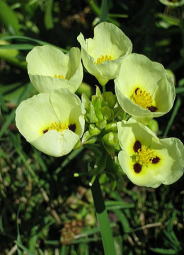
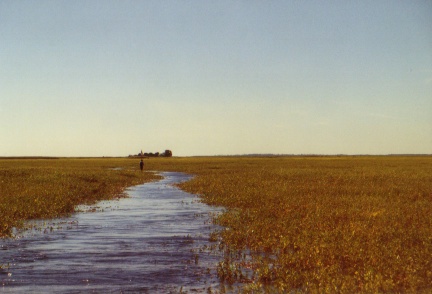
'Thanks. It's too shallow for your boat from here. I 'll go on foot', the
young man casually said. I was appalled by the idea and even Peto seemed
worried. There still was a good mile left in the piranha's den. Laughing
aloud, he jumped into the waist deep water, carrying a bagful of bread
on his shoulder. 'No problem' he assured us 'Besides, my folks on that
island must have noticed me by now. We always see everything. Now, off
you go and good luck fishing!' With a big grin, he even pushed our boat
back into the deep water.
His silhouette became smaller and smaller as we stood there in anxiety.
I felt ashamed of my ignorance. Protecting the nature is great. But that
is Westerner's ethics brought in by the Europeans. Meanwhile, there always
has been a sublime existence of human being.
''Wow, I can't believe it!! See that?'' muttered Peto, pointing out at
the direction where the young man's silhouette had disappeared. 'A canoe
is coming. His family must have noticed him and sent a canoe to fetch him
home.'
I stood up on the bow squinting my eyes through the prescribed sunglasses.
But alas, I could not see it. To the eyes of those who have become so unnatural,
not everything can be seen. I felt a little sad, but deeply grateful, for
the fact that the lives of us two - totally different lives of ours - crossed
even for a moment.
In time, the day ends and silence rules.
But we know it. Deep in the midst of the green labyrinth, there are islands
not charted on any map, and that some people call home.
- Back
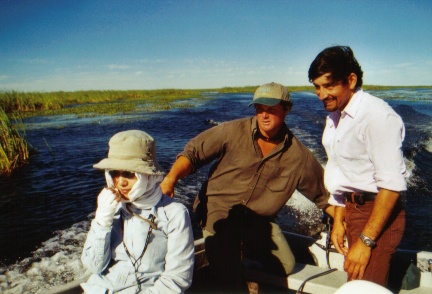
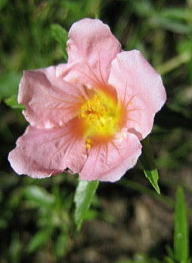
The marshlands constantly changes itself. Those floating islands drift
on in the winds, while those rooted ones would grow and then perish over
the years. Because the marsh are generally shallow and filled with vegetation,
boat with propeller cannot freely move about. Even Peto, who has fished
and guided here over two decades, says the Ibera he had seen must be a
mere fraction of it. 'The only ones who really know Ibera', continued Peto,
'are those living off from the land.'
Next day, we saw a young man on the river bank, scooping up water from
an old dingy. He said he was a gaucho working in one of the ranch nearby,
and going to visit his family on one of the Ibera islands. But it's such
a old boat that hardly floats. How can we see him off into the world of
crocs and piranhas? We insisted we must ferry him in our boat to his home,
and though not at all concerned, he eventually accepted our offer. Following
his navigation, Peto steered the boat deftly through the narrow channels.
After some half an hour's boating, we somehow passed through the green
labyrinth and found an island of his family on the skyline.
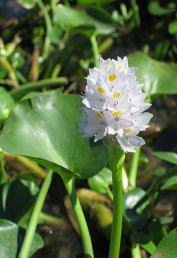
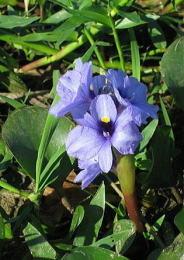
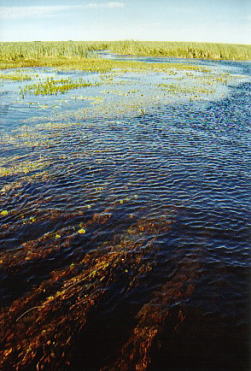
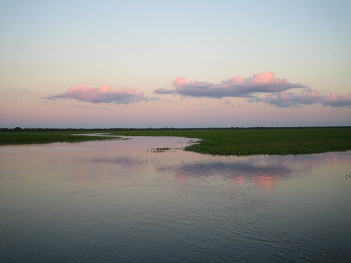
Esteros del Ibera. A huge tropical marshland filled only by water, grass
and the sky, covers an area of 18 thousand square kilometers. If you stand
right in the middle of it, the only thing you'll see is one big green horizon
all around you.
Ibera means, in the tongue of the indigenous people, clear water. Sure
enough, the sandy bottom, through which spring water keeps welling out,
works as a natural filter, giving the water a mysterious shine like an
aged whiskey.
Hyacinth and other floating plants, such as 'Carrico' as locally called,
are found in great abundance. Once you look closely, there are countless
lovely flowers welcoming the advent of the summer.






